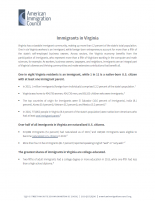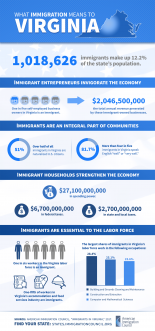- Fact Sheet
Immigrants in Virginia
Published
Virginia has a sizeable immigrant community, making up 13 percent of the state’s total population. Most of the state's immigrants are naturalized citizens and pursued higher education. The majority of immigrants speak English well and are naturalized citizens.
One in six Virginia workers is an immigrant, while foreign-born entrepreneurs account for a fifth of the state’s self-employed business owners. Across sectors, the Virginia economy benefits from the participation of immigrants, who represent nearly a quarter of Virginians working in the computer and math sciences. As neighbors, business owners, taxpayers, and workers, immigrants are an integral part of Virginia’s diverse and thriving communities and make extensive contributions that benefit all.
One in eight Virginia residents is an immigrant, while one in nine residents is a native-born U.S. citizen with at least one immigrant parent.
- In 2018, 1.1 million immigrants (foreign-born individuals) comprised 13 percent of the population.
- Virginia was home to 517,013 women, 469,997 men, and 78,066 children who were immigrants.
- The top countries of origin for immigrants were El Salvador (12 percent of immigrants), India (9 percent), the Philippines (6 percent), Korea (5 percent), and Mexico (5 percent).
- In 2018, 939,718 people in Virginia (11 percent of the state’s population) were native-born Americans who had at least one immigrant parent.
More than half of all immigrants in Virginia are naturalized U.S. citizens.
- 573,998 immigrants (54 percent) had naturalized as of 2018, and 164,243 immigrants were eligible to become naturalized U.S. citizens in 2017.
- More than four in five (83 percent) immigrants reported speaking English “well” or “very well.”
Immigrants in Virginia tend to be college educated.
- More than two-fifths (44 percent) of adult immigrants had a college degree or more education in 2018, while nearly one-fifth (19 percent) had less than a high school diploma.
|
Education Level |
Share (%) of All Immigrants |
Share (%) of All Natives |
|---|---|---|
|
College degree or more |
44 |
39 |
|
Some college |
19 |
28 |
|
High school diploma only |
19 |
25 |
|
Less than a high school diploma |
19 |
9 |
|
Source: U.S. Census Bureau, 2018 American Community Survey 1-Year Estimates. |
||
Tens of thousands of U.S. citizens in Virginia live with at least one family member who is undocumented.
- 275,000 undocumented immigrants comprised 27 percent of the immigrant population and 3 percent of the total state population in 2016.
- 326,492 people in Virginia, including 143,300 U.S. citizens, lived with at least one undocumented family member between 2010 and 2014.
- During the same period, about 1 in 20 children in the state was a U.S. citizen living with at least one undocumented family member (98,768 children in total).
Virginia is home to nearly 10,000 Deferred Action for Childhood Arrivals (DACA) recipients.
-
§ 9,410 active DACA recipients lived in Virginia as of March 2020, while DACA has been granted to 12,368 people in total since 2012.
-
As of 2019, 35 percent of DACA-eligible immigrants in Virginia had applied for DACA.
-
An additional 5,000 residents of the state would satisfy all but the educational requirements for DACA, and fewer than 1,000 would become eligible as they grew older.
One in six Virginia workers is an immigrant, making up a vital part of the state’s labor force.
- 730,057 immigrant workers comprised 17 percent of the labor force in 2018.
- Immigrant workers were most numerous in the following industries:
|
Industry |
Number of Immigrant Workers |
|---|---|
|
Professional, Scientific, and Technical Services |
102,994 |
|
Health Care and Social Assistance |
91,279 |
|
Construction |
89,538 |
|
Retail Trade |
75,180 |
|
Accommodation and Food Services |
74,057 |
|
Source: Analysis of the U.S. Census Bureau’s 2018 American Community Survey 1-year PUMS data by the American Immigration Council. |
|
- The largest shares of immigrant workers were in the following industries:
|
Industry |
Immigrant Share (%) |
|---|---|
|
Construction |
26 |
|
Administrative & Support; Waste Management; and Remediation Services |
23 |
|
Transportation and Warehousing |
22 |
|
Other Services (except Public Administration) |
20 |
|
Accommodation and Food Services |
19 |
|
Source: Analysis of the U.S. Census Bureau’s 2018 American Community Survey 1-year PUMS data by the American Immigration Council. |
|
Immigrants are an integral part of the Virginia workforce in a range of occupations.
- In 2018, immigrant workers were most numerous in the following occupation groups:
|
Occupation Category |
Number of Immigrant Workers |
|---|---|
|
Management |
77,523 |
|
Construction and Extraction |
74,348 |
|
Office and Administrative Support |
63,163 |
|
Computer and Mathematical |
62,882 |
|
Sales and Related |
61,984 |
|
Source: Analysis of the U.S. Census Bureau’s 2018 American Community Survey 1-year PUMS data by the American Immigration Council. |
|
- The largest shares of immigrant workers were in the following occupation groups:
|
Occupation Category |
Immigrant Share (%) |
|---|---|
|
Building and Grounds Cleaning & Maintenance |
29 |
|
Construction and Extraction |
28 |
|
Computer and Mathematical |
23 |
|
Farming, Fishing, and Forestry |
22 |
|
Personal Care and Service |
22 |
|
Source: Analysis of the U.S. Census Bureau’s 2018 American Community Survey 1-year PUMS data by the American Immigration Council. |
|
- Undocumented immigrants comprised 5 percent of Virginia’s workforce in 2016.
Immigrants in Virginia have contributed billions of dollars in taxes.
- Immigrant-led households in the state paid $8.8 billion in federal taxes and $3.8 billion in state and local taxes in 2018.
- Undocumented immigrants in Virginia paid an estimated $441.3 million in federal taxes and $260.5 million in state and local taxes in 2018.
- Virginia DACA recipients and DACA-eligible individuals paid an estimated $29.4 million in state and local taxes in 2018.
As consumers, immigrants add tens of billions of dollars to Virginia’s economy.
- Virginia residents in immigrant-led households had $31.2 billion in spending power (after-tax income) in 2018.
Immigrant entrepreneurs in Virginia generate nearly $2 billion in annual business revenue.
- 84,983 immigrant business owners accounted for 21 percent of all self-employed Virginia residents in 2018 and generated $1.7 billion in business income.
- In 2018, immigrants accounted for 31 percent of business owners in the Washington, D.C. metropolitan area (which spans D.C., Maryland, and Virginia) and 17 percent in the Virginia Beach/Norfolk/Newport News metro area (which spans Virginia and North Carolina).
Virginia is home to thousands of Deferred Action for Childhood Arrivals (DACA) recipients.
§ 9,410 active DACA recipients lived in Virginia as of March 2020, while DACA has been granted to 12,368 people in total since 2012.
§ As of 2019, 35 percent of DACA-eligible immigrants in Virginia had applied for DACA.
An additional 5,000 residents of the state would satisfy all but the educational requirements for DACA, and fewer than 1,000 would become eligible as they grew older.


